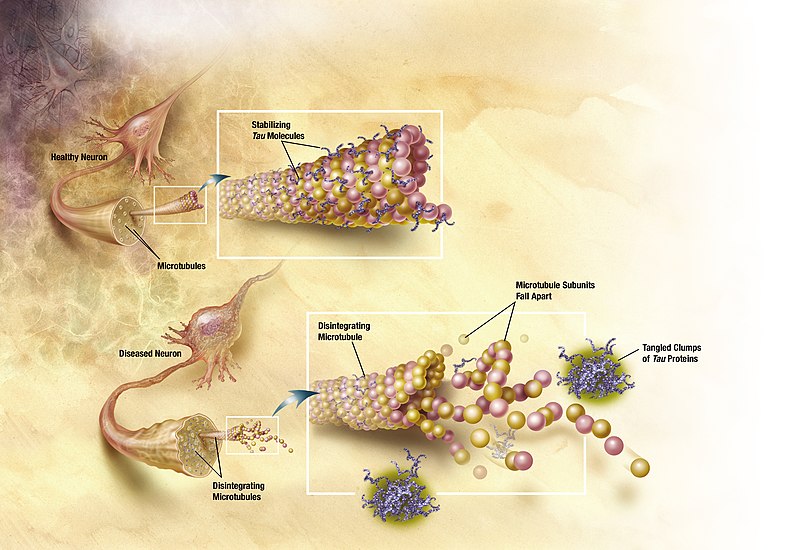An animal study shows that the cause of Alzheimer's may be related to an infectious process. Mice, that normally never develop the neurodegenerative disease, that were 'infected' with brain tissue from an Alzheimer's patient started developing the disease themselves, which spread throughout the brain. Because Alzheimer's is characterized by malicious folding of certain proteins that consequently accumulate in the brain, it could very well have the same underlying pathology as infectious prion diseases such as the mad cow disease, and Creutzfeldt-Jakob. The discovery could hint towards the origin of Alzheimer's, which as of now is still largely unknown.
According to the scientists, all of the mice that were given brain tissue from an Alzheimer's patient developed the disease themselves, showing a strong indication of an infection-like process. It does not prove that Alzheimer's disease can be transmitted from one patient to another, but the process could be similar. It is already known that diseases in which accumulating proteins are the cause of the disease can be transmitted by infection. In so-called prion diseases, an infectious and accumulating protein is underlying the pathology. Patients who are exposed to these misfolded proteins can obtain the illness by converting the normal protein into a malicious one. Replication of a virus is somewhat similar: their genetic material enters our bodies, whereafter it is being copied and accumulated to further transmit the disease by creating new viruses with the same genetic material.
The pathology of Alzheimer's is based on incorrect folding of the proteins Tau and Beta-amyloid. These two consequently accumulate in the brain, causing death of the tissue. The disease often starts at a specific area in the brain, whereafter it spreads throughout the brain, eventually killing the patient. Because brain areas involved with memory are usually affected first, the disease most commonly presents itself as a form of dementia.
Showing that Alzheimer's disease can be induced in mice by an infection-like process is a step forward in discovering mechanisms that start the disease. Currently, it is often thought that the disease starts spontaneously without a direct cause. An infection process is unlikely to be the full story of Alzheimer's, though. The absence of a clear infectious agent in human Alzheimer's indicates that it is likely that non-infectious, endogenous mechanisms can also induce the disease. However, if the infectious process does play a role in human Alzheimer's, this may lead to novel therapies that may prevent neurodegeneration in a subset of patients. Currently, therapy focuses on slowing the progress of the disease, preventing it is impossible.
According to the scientists, all of the mice that were given brain tissue from an Alzheimer's patient developed the disease themselves, showing a strong indication of an infection-like process. It does not prove that Alzheimer's disease can be transmitted from one patient to another, but the process could be similar. It is already known that diseases in which accumulating proteins are the cause of the disease can be transmitted by infection. In so-called prion diseases, an infectious and accumulating protein is underlying the pathology. Patients who are exposed to these misfolded proteins can obtain the illness by converting the normal protein into a malicious one. Replication of a virus is somewhat similar: their genetic material enters our bodies, whereafter it is being copied and accumulated to further transmit the disease by creating new viruses with the same genetic material.
The pathology of Alzheimer's is based on incorrect folding of the proteins Tau and Beta-amyloid. These two consequently accumulate in the brain, causing death of the tissue. The disease often starts at a specific area in the brain, whereafter it spreads throughout the brain, eventually killing the patient. Because brain areas involved with memory are usually affected first, the disease most commonly presents itself as a form of dementia.
Showing that Alzheimer's disease can be induced in mice by an infection-like process is a step forward in discovering mechanisms that start the disease. Currently, it is often thought that the disease starts spontaneously without a direct cause. An infection process is unlikely to be the full story of Alzheimer's, though. The absence of a clear infectious agent in human Alzheimer's indicates that it is likely that non-infectious, endogenous mechanisms can also induce the disease. However, if the infectious process does play a role in human Alzheimer's, this may lead to novel therapies that may prevent neurodegeneration in a subset of patients. Currently, therapy focuses on slowing the progress of the disease, preventing it is impossible.



No comments:
Post a Comment